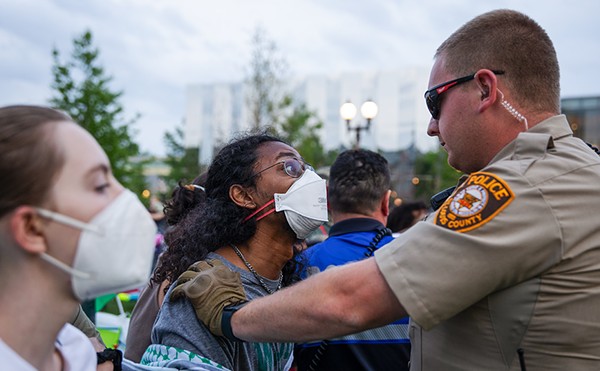We've been reporting about the rise in heroin overdoses in the region, and one of the people who's come out strongly against the epidemic is Stephen Wigginton, U.S. attorney for the Southern District of Illinois. Last month, Wigginton announced that his office had begun to treat overdose cases as homicide cases, going after the dealers as if they were murderers.
He cites the Controlled Substances Act, section 841, which states that it's unlawful for any person to knowingly or intentionally manufacture or distribute a controlled substance, and if the result of the sale is the death of another person, the range of punishment shall be twenty years to life imprisonment.
We caught up with Wigginton to see if that strategy really has any teeth.
Daily RFT: It seems that up until this point, the drug dealers have been winning the battle on heroin. Why has this become such a big problem?
Wigginton: It's becoming a drug of choice among many young adults and teenagers. The national drug experts tell us that one of the reasons it's become more popular is because of the federal crackdown on methamphetamine. And the Mexican drug cartels have well-established distribution networks throughout the United States that are being utilized for the transportation of heroin as opposed to bulk marijuana ...
Our goal is simple: to reduce number of heroin overdose deaths and prosecute those persons who distribute illegal drugs that result in death of another.
Q: Can you elaborate on your new strategy?
A: Under my direction, we're now taking lead in coordinating with state and local agencies to prosecute drug dealers who cause the overdose of another person. My office has taken lead in this. We are unique among U.S. attorney's offices in that we've prosecuted eight of these cases ...
You have the combination of inexperienced heroin users with increased purity levels in heroin that are now causing serious physical injury or death. And that's what led us to increased focus on prosecuting those who illegally distribute drugs that lead to those results.
Q: What's the difference between treating fatal overdoses as if they're homicides and treating them as traditional drug deals?
A: We don't use word homicide. It's what you normally call "federal homicide" statute, but it's called "illegal distribution of drugs resulting in death." The difference is that under federal statute, the mandatory minimum term that the court can sentence a person convicted in this crime is twenty years. With a prior felony, the minimum can be raised to 30 years, and the maximum is life in prison ... We've had eight prosecutions within the last several years.
Q: So this strategy isn't necessarily new, but you're attempting to bolster it?
A: It's an enhanced strategy. It's been in the books for several years, but we're now using that statue as one of the tools in our toolbox to fight crime.
Q: There are many layers to drug dealing. I could OD on a drug that a friend gave me for free, and he might have gotten it from a dealer who got it from a dealer who got it from a dealer. Where do you draw the line? What evidence do you need?
A: Each case would be evaluated on its own merits. It doesn't require the actual sale of heroin to be prosecuted. It just requires distribution, which means you can be prosecuted even if you give away your heroin. We don't have to prove you intended to kill or hurt somebody.
Q: You say you're taking the lead on this among U.S. attorney's offices. How can we quantify that?
A: I don't want to misquote any other district ... The Southern District of Illinois is using this statue aggressively. We just had a two-day training program on March 30 and 31 with the Madison County States Attorney's Office, the D.E.A. and the Madison County Coroner's Office called Pharmaceutical Overdose Death Investigation Seminar to deal with pharmaceutical overdose and heroin overdose and how we need to change mindset of law enforcement -- that when they arrive on an overdose scene they need to treat it as crime scene.
When asked about recent examples of convicting a drug dealer under the most severe federal statute, Wigginton directed us to the following case, involving an East St. Louis crack house. (Incidentally, the convicted man tried to revive the OD victim by stuffing frozen meat down his pants.)






